Randal Rauser's Blog, page 155
April 12, 2016
91. Andy Bannister on Atheism, Morality, and the Meaning of Life

In his famous essay “A Free Man’s Worship,” Bertrand Russell describes the plight of our species in a godless universe with a haunting eloquence that ranks among the most memorable passages of twentieth century philosophy. As Russell puts it, man’s
“origin, his growth, his hopes and fears, his loves and his beliefs, are but the outcome of accidental collocations of atoms; that no fire, no heroism, no intensity of thought and feeling, can preserve an individual life beyond the grave; that all the labours of the ages, all the devotion, all the inspiration, all the noonday brightness of human genius, are destined to extinction in the vast death of the solar system, and that the whole temple of Man’s achievement must inevitably be buried beneath the debris of a universe in ruins…”
If Russell is correct, if our future is dissolution to nothingness in the blink of a cosmic eye, then what meaning could there possibly be to life? Can life be meaningful in a godless universe? Or does atheism leave us with little more than diversionary pursuits that merely serve to dull the ache of our pending annihilation?
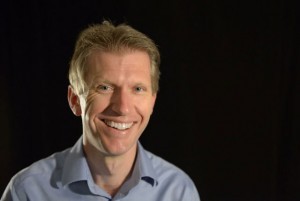
Existentially well-adjusted apologist Andy Bannister
In this episode of The Tentative Apologist Podcast, we take on this question of atheism, morality, and meaning with my friend, Dr. Andy Bannister. Andy is the Director and Lead Apologist for RZIM Canada. He is the author of The Atheist Who Didn’t Exist: Or the Dreadful Consequences of Bad Arguments (Monarch, 2015) and An Oral-Formulaic Study of the Qur’an (Lexington, 2014). In this conversation we peer into the abyss as Andy and I wrestle together with one of the great questions of academic philosophy and existential concern: can life be meaningful in a godless universe?
God or Godless has arrived in Korean translation
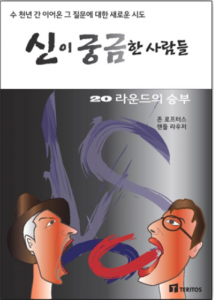 My 2013 book God or Godless (co-authored with John Loftus) was just released this month in Korean translation. According to my Korean wife, there are already several reviews available. (I can read the Korean alphabet, but sadly I don’t know what I’m reading so that isn’t much help.)
My 2013 book God or Godless (co-authored with John Loftus) was just released this month in Korean translation. According to my Korean wife, there are already several reviews available. (I can read the Korean alphabet, but sadly I don’t know what I’m reading so that isn’t much help.)
The cover is quite interesting with cartoon depictions of Loftus and yours truly. I don’t mind the rendering except that it looks like I’m wearing lipstick. And I’m not sure if the reddish wisp emerging from my mouth is meant to symbolize learned discourse or halitosis.
But who am I to quibble? It’s always nice to see your books in another language. This is my second translation. The first was a Portuguese translation of my 2009 book Finding God in the Shack. The translation, Encontre deus na Cabana, went on to become a bestseller in Brazil where it sold over 300,000 copies. Let’s hope for a similar fate for the Korean translation of God or Godless!
April 10, 2016
A busy weekend of dialogue on Islam and atheism
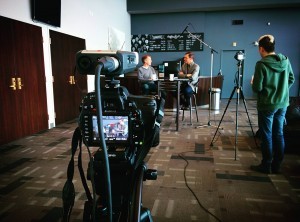
Andy Bannister and Randal talking atheism over a Bold Cup of Coffee
On Friday night I had the privilege of serving as the moderator in the second installment in the Taylor Seminary/Wahl Centre “Crucial Conversations” series. (The first installment was my dialogue with atheist Justin Schieber which you can watch here.)
This time the dialogue featured Christian apologist Andy Bannister and local Muslim Imam Sherif Ayoup discussing the similarities and differences between Christianity and Islam. The venue was packed with about 400 people as Andy and Imam Sherif shared their perspectives with eloquence and generosity. Over a couple hours the conversation covered everything from God to ISIS to salvation and heaven. Fortunately the evening was filmed and I’ll be making it available in the future.
The following morning Andy and I traveled up to Gateway Alliance Church in north Edmonton to visit my friend Drake De Long-Farmer of the website Bold Cup of Coffee. On their website Bold Cup promotes “Healthy and helpful dialogue in a world full of conflict and disagreement.” That mission captures my heartbeat in the subtitle of one of my books: “Dialogue in a world of loud voices and hardened opinions.” I have previously been on Bold Cup talking about apologetics and heaven. This time we recorded two episodes which will be featured both on Bold Cup and on my podcast. In the first I interviewed Andy on his 2015 book The Atheist Who Didn’t Exist. And in the second Drake joined us for a discussion of Islam.
Before letting Andy go, I forced him to record two more podcasts. On the first we focused in on the question of whether Muslims and Christians worship the same God. And on the second we addressed the topic of atheism, morality and meaning. That interview will be featured this week in The Tentative Apologist Podcast.
My thanks to Andy Bannister, Imam Sherif, Drake De-Long Farmer, and everybody else who made this busy but deeply enriching weekend possible.
April 7, 2016
Should a Christian support a pro-choice candidate? Should a Christian support a pro-torture candidate?
Occasionally I encounter Christian conservatives who insist that a Christian should not support a pro-choice political candidate. As a pro-life Christian, I agree with those Christian conservatives that Christians ought to be pro-life. But I don’t agree that a politician’s position on abortion can serve as a litmus test for a Christian’s support or opposition. In Canada’s most recent national election I voted for the NDP despite the party’s staunch pro-choice position. I did so because on balance I believed that the NDP platform was most fully in line with my Christian convictions, that pro-choice position notwithstanding.
At the same time, I understand why other Christians would vote against the NDP out of their Christian convictions. The reality is that these judgments are morally complex, and informed individuals of good will can differ in their support of various political parties.
With that I turn my gaze back to the tumultuous election season south of the border. There are several reasons why a Christian might be unwilling to vote for Donald Trump or Ted Cruz. One of those reasons is the support these candidates have given for torturing enemy combatants. I have already written about this in the article “Republican presidential candidates on torture: Ted Cruz really is a liar and Donald Trump is a brute.”
Keeping that in mind, I want to draw your attention to a new book by Eric Fair titled Consequence: A Memoir. In 2004 Fair traveled to Iraq to work as a contract interrogator. The horrors he would inflict on others under the sanitized euphemism of “enhanced interrogation techniques” would haunt him to this day. Fair writes:
We pass by the interrogation room where Tyner has been working on Raad Hussein. We haven’t heard Tyner scream or throw anything today. The door to the room, a flimsy sheet of plywood, has blown open in the hot desert wind. Inside, Raad Hussein is bound to the Palestinian chair. His hands are tied to his ankles. The chair forces him to lean forward in a crouch, forcing all of his weight onto his thighs. It’s as if he’s been trapped in the act of kneeling down to pray, his knees frozen just above the floor, his arms pinned below his legs. He is blindfolded. His head has collapsed into his chest. He wheezes and gasps for air. There is a pool of urine at his feet. He moans: too tired to cry, but in too much pain to remain silent.
Henson comes out into the hallway and walks past the room. He covers the side of his face as he walks by and says, ‘I don’t even want to know.’
I am silent. This is a sin. I know it as soon as I see it. There will be no atonement for it. In the coming years, I won’t have the audacity to seek it. Witnessing a man being tortured in the Palestinian chair requires the witness to either seek justice or cover his face. Like Henson in Fallujah, I’ll spend the rest of my life covering my face.” (p. 122)
So where does this leave us as regards the current Republican front runners? Donald Trump relishes torture and promises to inflict much worse on alleged enemies of the state than is described in this passage. Meanwhile Ted Cruz dishonestly invokes a spurious definition of torture as inflicting “excruciating pain that is equivalent to losing—losing organs and systems.” This definition would not only allow Cruz to approve water boarding: it would also allow him to approve the torture of the Palestinian chair.
And that brings me back to Eric Fair. He judges the torture of the Palestinian chair to constitute a sin. I agree with him. And that provides one good reason why a Christian would conclude they cannot support either Donald Trump or Ted Cruz.
Of course, matters are not so simple, because one might believe Cruz has other positions favorable to a Christian worldview which, on balance, are sufficient to justify voting for him. (Trump is different: I believe he has no redeeming qualities and that he is very possibly a clinical psychopath. He certainly is a protean fascist and no Christian should vote for him.)
Setting aside Trump, the lesson is simply this: political life often involves moral compromise and the settling for the least bad of several options. Thus, just as one might choose Cruz over another candidate despite his support for torture, so one might choose a pro-choice candidate over Cruz despite their support for the right to choose.
I first became aware of Fair’s book based on his excellent interview at Democracy Now. You can watch it here.
April 5, 2016
The Gospel in the lungs of a Las Vegas street preacher
 Last week I visited Las Vegas with my family. While relaxing in our room on the 23 floor one afternoon I began to hear an annoying squawk from down on the street coming through the heavy plate glass window. The incessant prattling noise sounded like an angry street preacher rising up above the din of the busy city.
Last week I visited Las Vegas with my family. While relaxing in our room on the 23 floor one afternoon I began to hear an annoying squawk from down on the street coming through the heavy plate glass window. The incessant prattling noise sounded like an angry street preacher rising up above the din of the busy city.
So I finally got up to take a look.
And there he was, standing on curbside, just to the right of the bus by the intersection, holding up a black and white sign and bellowing into a bullhorn.
Can you see him? He’s barely more than a smudge of pixels in the picture, but my goodness, was he loud. Sitting in a chair with a window closed on the 23 floor I could make out his sermon of anger, condemnation, and a shrill call for repentance.
I can’t imagine what it sounded like on the street.
April 3, 2016
90. Apologetics Today: A Conversation with Tawa Anderson

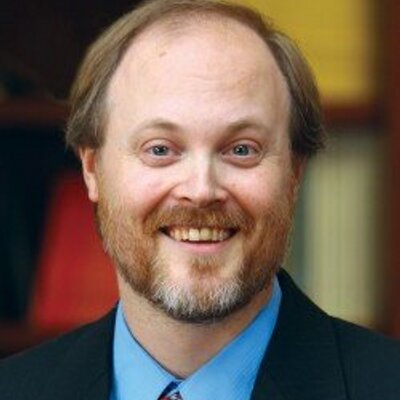
Tawa Anderson, apologetic diplomat.
It was the best of times, it was the worst of times, it was the age of wisdom, it was the age of foolishness, it was the epoch of belief, it was the epoch of incredulity, it was the season of Light, it was the season of Darkness, it was the spring of hope, it was the winter of despair…
These famous opening words from Charles Dickens’ classic novel A Tale of Two Cities capture something of the current paradoxical state of apologetics. On the one hand, many people believe this is the best of times for Christian apologetics, an age that is characterized by increasingly sophisticated arguments which are being defended by articulate, world-class scholars.
On the other hand, many critics insist that this is the worst of times for Christian apologetics, that the arguments are weak and those who propagate them represent the last gasps of a discredited approach to rational religious belief.
So what correctly describes apologetics? Is it the best of times? The worst of times? Or do we find ourselves somewhere in the middle?
In this episode of The Tentative Apologist Podcast we explore this question in a conversation with Dr. Tawa Anderson. Dr. Anderson is Assistant Professor of Philosophy and Director of the Honor Program at Oklahoma Baptist University. Since I had the honor of lecturing at Oklahoma Baptist in January I can speak from experience that Dr. Anderson is a dedicated teacher who is beloved of his students.
In this conversation we consider the various polarized responses to apologetics and consider two important challenges to the Christian apologist today: the problem of Christian diversity and the problem of biblical violence.
On helping the poor
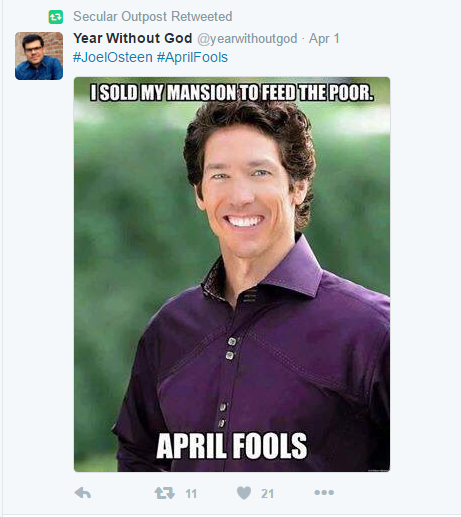
I almost retweeted this dig at Joel Osteen.
Then I remembered all the things I haven’t sold to feed the poor.
April 2, 2016
Thoughts on Being at the Center of Everything
I’m a big fan of astronomer Phil Plait’s “Bad Astronomy” blog. Plait opens his April 1st article (no joke) titled “At the Heart of the Milky Way Galaxy” like this:
Our galaxy, the Milky Way, is a ridiculously huge collection of gas, dust, and stars … something like 200 billion stars, give or take.
That’s a lot.
In our neck of the woods stars are pretty far apart, from 20 trillion to 50 trillion kilometers on average. The nearest star known to the Sun, Proxima Centauri, is about 40 trillion kilometers away. But in the center of the galaxy—downtown—they’re packed a lot more closely together. A cube just big enough to fit the Sun on one side and Proxima on the other would hold 1 million stars if it were in the galactic core. A million.
Think about it like this. If the center of the Milky Way is like the bright lights of Las Vegas packed with two million people, you’re living out in the high desert alone, your nearest neighbor being a couple miles away, the only movement on the horizon being the rolling tumbleweed.
Over the centuries countless people have equated human importance with geographic location. In short, our significance is tied to our centrality. Consequently, if we’re not at the center of everything, then our significance is called into question. So if you view the human species consigned to a quiet life out in the high desert far from the bright lights and bustle of the dazzling casinos that line the strip, it’s no surprise that you might be inclined to call into question our place in the universe.
For centuries Christians fanned the flame of the “geographic centrality thesis”, particularly in the Ptolemaic cosmology that placed planet earth as the center of the cosmos. To be sure, there are countless instances where geographic centrality is indicative of significance. But Christians would be wise to eschew any attempt to tie existential human significance to geographic placement in the cosmos. These assumptions are highly dubious (see, for example, my article “Does the size of the universe support atheism or Christianity?“). Nonetheless, they have been deeply corrosive of Christian belief in the modern world.
If you still find yourself gazing out longingly at the bustling core, remember that at the center of the galaxy, millions of stars in close proximity means the ongoing threat of gravitational perturbations, supernovae, radiation, gamma-ray bursts and countless other fatal threats. In short, we wouldn’t last long in the bright lights of that big city.
Perhaps the relative isolation of the high desert is not so bad after all.
March 30, 2016
The A-Unicornist reviews Is the Atheist My Neighbor?
Here is a link to another review of Is the Atheist My Neighbor? by an atheist, in this case The A-Unicornist. As with the previous review by Ed Buckner, this one is also very positive.
Irrational? Faith from Ignatius of Loyola to Carl Sagan
The philosopher Wilfrid Sellars famously distinguished between the “manifest image” of the world — i.e. the way the world presents to the average person — and the “scientific image” — i.e. the way the world presents to the scientist. Evolutionary biologist Richard Lewontin wonderfully captured the chasm between the manifest and scientific images in an influential New York Review of Books review of Carl Sagan’s book The Demon-Haunted World. The review is very much worth reading as Lewontin methodically deconstructs the simplistic “science/reason vs. religion/faith” binary that frames the way the village new atheist views the world.
The new atheist revels in a simplistic binary in which they exercise reason over-against the benighted religious fools who exercise irrational faith. Along the way they completely fail to recognize the rationality in dissenting views … or the inescapable faith in their own.
Lewontin beautifully illustrates the point when he exclaims in mock amazement:
“Do physicists really expect me to accept without serious qualms that the pungent cheese that I had for lunch is really made up of tiny, tasteless, odorless, colorless packets of energy with nothing but empty space between them?”
The importance of this passage is that Lewontin realizes there really is a conflict of loyalties here. The person who defers to the judgment of the scientist over their senses makes a faith judgment. That’s not to say it is right or wrong. But it is a matter of explicit trust in what scientists say. It is faith.
With that in mind, let’s switch for a moment back to a memorable declaration by sixteenth century Ignatius of Loyola, faithful Catholic and founder of the Jesuits:
“If we wish to proceed securely in all things, we must hold fast to the following principle: What seems to me white, I will believe black if the hierarchical church so defines.”
Such a bald declaration to elevate the testimonial witness of others over the testimony of one’s own senses is denounced as anathema by the new atheist. But note that this same new atheist expects the average person today to defer to the physicist when it comes to the nature of the cheese they had for lunch. And that’s the key. It turns out that the issue is not reason vs. faith. Rather, it is this: where does your faith lie? Does it lie with the Catholic Church? Or the physicists? Or perhaps the new atheist cults of celebrity?
And since such questions are hopelessly simplistic, let’s note a far more satisfying possibility, namely that the nature of one’s deference to faith depends on the domain in question. For example, one might defer to the physicist when describing the cheese and the Church when describing salvation. And just as deferring to the physicist might require the abandonment or qualification of a manifest image, so might it be for the deference to the church.
Yes, this can get complicated. Yes, it isn’t always clear when we defer to an authority and when we retain our manifest image. The relationship between reason and faith can get complicated. But then, who said reality is simple?




